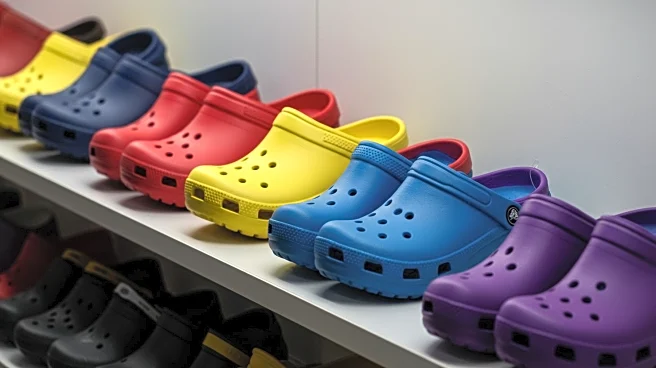What is the story about?
What's Happening?
Crocs, the popular foam footwear brand, is experiencing a significant downturn in its market performance, with its share price dropping nearly 30 percent, marking its lowest level in three years. The company has forecasted a revenue decline of between 9 and 11 percent for the current quarter. This downturn is largely attributed to tariffs imposed by President Trump, which have affected the company's financial outlook. Crocs, known for its distinctive rubbery perforated clogs, has been a staple in casual footwear since its rise in popularity in 2006. Despite its past success, including a record revenue during the pandemic, the brand is now facing challenges due to trade uncertainties and changing consumer preferences.
Why It's Important?
The impact of President Trump's tariffs on Crocs highlights the broader implications of trade policies on U.S. businesses. As tariffs increase costs for companies, they can lead to reduced profitability and market competitiveness. Crocs' situation underscores the vulnerability of consumer goods companies to international trade dynamics and policy changes. The decline in Crocs' market performance may signal a shift in consumer preferences away from the 'ugly shoe' trend, affecting not only Crocs but also other brands in the same niche. This development could lead to strategic adjustments within the industry as companies seek to adapt to evolving market conditions.
What's Next?
Crocs may need to explore strategies to mitigate the impact of tariffs and regain its market position. This could involve diversifying its product offerings or seeking alternative manufacturing solutions to reduce costs. The company might also focus on strengthening its brand appeal to counteract the waning interest in the 'ugly shoe' trend. Stakeholders, including investors and industry analysts, will be closely monitoring Crocs' financial performance and strategic decisions in the coming months. Additionally, any changes in trade policy or tariff regulations could further influence the company's outlook.
Beyond the Headlines
The situation with Crocs also raises questions about the long-term sustainability of fashion trends and the role of celebrity endorsements in maintaining brand popularity. As consumer tastes evolve, companies must balance innovation with tradition to remain relevant. The ethical implications of trade policies, such as tariffs, on global supply chains and their impact on domestic employment and production are also worth considering. Crocs' experience may serve as a case study for other companies navigating similar challenges in the global market.















